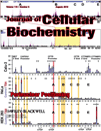
Cell Communication and Signaling
Scope & Guideline
Unleashing Insights into Cell Communication Dynamics
Introduction
Aims and Scopes
- Cellular Communication Mechanisms:
Explores the various ways in which cells communicate, including through extracellular vesicles, signaling molecules, and direct cell-to-cell contacts. - Signaling Pathways in Disease:
Investigates how alterations in signaling pathways contribute to diseases such as cancer, autoimmune disorders, and neurodegenerative diseases. - Extracellular Vesicles and Their Role:
Examines the role of extracellular vesicles in mediating cell communication, their impact on tumor microenvironments, and their potential as biomarkers and therapeutic targets. - Molecular Genetics and Therapeutics:
Focuses on the genetic basis of diseases and the development of targeted therapies that modulate signaling pathways to treat various conditions. - Microenvironment Interactions:
Studies the interactions between different cell types within tissues, particularly how these interactions influence disease progression and therapeutic responses. - Metabolic Reprogramming:
Explores how changes in metabolic pathways affect cellular signaling and contribute to the pathology of various diseases.
Trending and Emerging
- Cancer Immunotherapy and Signaling:
Research focusing on the signaling pathways involved in immune evasion and the development of immunotherapies is rapidly gaining traction, highlighting the intersection of cell signaling and cancer treatment. - Exosome Biology and Therapeutics:
There is an increasing emphasis on the role of exosomes in mediating intercellular communication, particularly their potential as therapeutic agents and biomarkers in various diseases. - Metabolic Signaling in Disease:
Studies examining how metabolic changes influence signaling pathways and contribute to diseases such as cancer and metabolic disorders are becoming more prominent. - Role of Gut Microbiota in Cell Signaling:
Research investigating the influence of gut microbiota on signaling pathways and immune responses is emerging as a significant area of interest, emphasizing the gut-brain axis and systemic effects. - Precision Medicine Approaches:
There is a growing trend towards integrating signaling research with precision medicine, focusing on personalized therapeutic strategies based on individual signaling profiles. - Regenerative Medicine and Cell Signaling:
Research exploring the role of signaling pathways in regenerative medicine and tissue repair is gaining momentum, particularly in the context of stem cell therapy and tissue engineering.
Declining or Waning
- Basic Cell Signaling Studies:
Research focusing solely on fundamental aspects of cell signaling without application to disease contexts is becoming less prevalent, as the field shifts towards translational research. - Single-Cell Analysis Techniques:
Although still important, the emphasis on single-cell analysis techniques appears to be waning, possibly due to the increasing adoption of multi-omics approaches that provide a more comprehensive view of cellular interactions. - Historical Reviews of Cell Signaling:
There has been a noticeable decline in publications that provide historical overviews of cell signaling pathways, as the focus has shifted to novel discoveries and applications. - Generalized Studies on Cytokines:
Research that broadly examines cytokines without specific context or application to disease mechanisms is less frequent, as studies become more targeted and hypothesis-driven.
Similar Journals

CELLULAR SIGNALLING
Transforming Understanding of Cellular DynamicsCELLULAR SIGNALLING, published by Elsevier Science Inc, is a premier journal within the realm of Cell Biology, boasting an impressive Q2 category ranking as of 2023. With an ISSN of 0898-6568 and an E-ISSN of 1873-3913, the journal has established itself as a critical platform for advancing the understanding of cellular mechanisms and signal transduction pathways since its inception in 1989. Covering a vast array of topics in Biochemistry, Genetics, and Molecular Biology, it ranks notably at 87 out of 285 in the Scopus list, placing it in the 69th percentile among its peers. The journal serves as an invaluable resource for researchers, professionals, and students seeking high-quality, impactful studies that drive forward the field of cellular biology. While it operates under traditional subscription access, its highlights include rigorous peer-reviewed articles, reviews, and insights that continue to shape current scientific discourse.

CELL BIOLOGY INTERNATIONAL
Exploring the Frontiers of Cellular ScienceCELL BIOLOGY INTERNATIONAL is a prestigious academic journal dedicated to the rapidly evolving field of cell biology, publishing high-quality research aimed at understanding cellular processes and their implications in various biological contexts. Published by Wiley, this journal has established its relevance with an H-Index that reflects its robust citation impact and a commendable Scopus Rank of #111 out of 285 in the field of Biochemistry, Genetics, and Molecular Biology, positioning it in the 61st percentile. Although it operates under a traditional subscription model, its influential insights are crucial for researchers, professionals, and students alike who are seeking cutting-edge developments in cellular mechanisms and their applications in medicine. The journal spans contributions dating back to 1993, providing a rich archive of knowledge that continues to shape the discourse within the scientific community. With a strong category ranking of Q3 in Cell Biology and Q2 in Medicine (miscellaneous) as of 2023, CELL BIOLOGY INTERNATIONAL stands as a reliable platform for disseminating transformative science in the cellular domain.

CELL PROLIFERATION
Exploring Innovations in Cellular and Molecular BiologyCELL PROLIFERATION, published by Wiley, is a leading open-access journal that has been at the forefront of research since its inception in 1968. With an impact factor that solidifies its position in the Q1 category of both Cell Biology and Medicine (Miscellaneous), this journal serves as a premier platform for disseminating groundbreaking studies in the field of cellular and molecular biology. The journal is renowned for its rigorous peer-review process and comprehensive coverage of topics related to cell growth, division, and differentiation, making it an invaluable resource for researchers, professionals, and students alike. With its notable Scopus ranking of #30 in Biochemistry, Genetics, and Molecular Biology: Cell Biology, and a robust open access model since 2019, CELL PROLIFERATION ensures that cutting-edge research is accessible to a global audience, fostering collaboration and innovation across the scientific community. Located in the United Kingdom, the journal remains committed to enhancing the understanding of cellular processes, thereby influencing developments in medicine and biotechnology.

SEMINARS IN CELL & DEVELOPMENTAL BIOLOGY
Exploring the Dynamics of Life's Building BlocksSEMINARS IN CELL & DEVELOPMENTAL BIOLOGY is a premier journal published by Academic Press Ltd - Elsevier Science Ltd, focusing on the vital domains of cell and developmental biology. With an impact factor that reflects its rigorous contributions to the field, this journal embodies the highest standards of academic excellence, currently ranking in the Q1 quartile for both Cell Biology and Developmental Biology categories as of 2023. Researchers and practitioners will appreciate its robust Scopus ranking, placing it within the top tiers of developmental biology and cell biology, with percentile ranks of 94th and 90th respectively, showcasing the journal's influential presence in the scientific community. The journal aims to disseminate comprehensive reviews, cutting-edge research articles, and significant advances in the understanding of cellular mechanisms and developmental processes, thereby catering to a diverse audience that includes researchers, scholars, and students dedicated to the life sciences. Given its commitment to open access, SEMINARS IN CELL & DEVELOPMENTAL BIOLOGY promotes widespread dissemination of knowledge, enhancing collaborative research efforts and driving innovation across biological disciplines.

JOURNAL OF CELL BIOLOGY
Transforming Understanding Through Cellular ResearchJOURNAL OF CELL BIOLOGY, published by Rockefeller University Press, stands as a leading authority in the fields of Cell Biology and Medicine, reflected by its esteemed Q1 ranking in both categories as of 2023. Established in 1955, this journal has become a pivotal platform for disseminating groundbreaking research that enhances our understanding of cellular processes and their implications in various biological contexts. With a broad scope that encompasses experimental and theoretical studies alike, the JOURNAL OF CELL BIOLOGY embraces a rich diversity of topics, making it essential reading for researchers, students, and professionals committed to advancing cellular research. Although the journal does not currently offer open access options, its robust reputation, underscored by a competitive Scopus ranking of 43 out of 285 in the Cell Biology category, ensures that published findings reach a wide audience and influence the ongoing discourse in the life sciences. For those interested in staying at the forefront of cell biological research, the JOURNAL OF CELL BIOLOGY represents a critical resource.

Advances in Cancer Biology-Metastasis
Fostering Collaboration for Cancer Breakthroughs.Advances in Cancer Biology-Metastasis is an emerging journal published by Elsevier, aimed at advancing our understanding of the complexities of cancer biology, with a specific focus on the mechanisms and pathways related to metastasis. With an E-ISSN of 2667-3940, this journal offers a platform for researchers, professionals, and students in the fields of Cancer Research and Cell Biology to disseminate innovative findings and discuss novel therapeutic approaches. Though currently classified in the Q4 quartile across both Cancer Research and Cell Biology categories, the journal aspires to enhance its impact through rigorous peer review and high-quality publication. Positioned to cover the years from 2021 to 2024, it seeks to bridge gaps in foundational knowledge and promote collaborative research efforts that could pivot the current understanding of cancer metastasis. Researchers are encouraged to take advantage of this platform to advocate for advancements in cancer biology, making significant contributions that can influence both academic and clinical practices.

CELLULAR AND MOLECULAR BIOLOGY
Fostering Novel Insights in Molecular ResearchCellular and Molecular Biology is a prominent academic journal published by C M B ASSOC, specializing in the dynamic fields of cellular and molecular biology. Established in 1977, this journal has consistently aimed to disseminate groundbreaking research that contributes to our understanding of biochemical processes, cell dynamics, and molecular mechanisms governing life. With its ISSN 0145-5680 and E-ISSN 1165-158X, the journal plays a vital role in the exchange of innovative ideas, evidenced by its coverage of research from 1977 to 2024. Although currently categorized in the Q4 quartile for major disciplines such as Biochemistry and Cell Biology, it is dedicated to fostering the development of the field by welcoming submissions that challenge the conventional understanding and lead to novel insights. Researchers and academics looking to contribute to or stay updated in the rapidly evolving landscape of molecular biology will find this journal a valuable resource for connecting with a global community of scientists.

MOLECULAR AND CELLULAR BIOLOGY
Driving Innovation in Molecular and Cellular ScienceMOLECULAR AND CELLULAR BIOLOGY, published by TAYLOR & FRANCIS INC, stands as a preeminent platform for researchers, professionals, and students engaged in the dynamic field of molecular and cellular biology. Established in 1981 and ongoing into 2024, the journal features cutting-edge research that spans across vital sub-disciplines, garnering a strong impact in its contributions to the scientific community. With an impressive Q2 ranking in Cell Biology and Q1 ranking in Molecular Biology for 2023, it consistently publishes high-quality articles that reflect the latest advancements and discoveries within the field. The journal is particularly well-regarded for its rigorous peer-review process and commitment to scientific excellence, making it an invaluable resource for those seeking to deepen their understanding of molecular mechanisms and cellular processes. Although not open access, the journal offers diverse access options for researchers to reach the latest findings. By maintaining a strong focus on biochemistry, genetics, and molecular biology, MOLECULAR AND CELLULAR BIOLOGY remains essential reading for anyone looking to contribute to or stay informed about significant developments within this pivotal area of study.

JOURNAL OF CELLULAR BIOCHEMISTRY
Transforming Knowledge into Breakthroughs in Cellular BiochemistryJournal of Cellular Biochemistry is a premier academic journal dedicated to advancing the field of biochemistry and cellular biology. Published by Wiley, this influential journal has a significant impact factor that underscores its relevance and authority within the scientific community. With its ISSN 0730-2312 and E-ISSN 1097-4644, the journal has been on the frontier of research since its inception in 1982, and is expected to continue publishing cutting-edge studies through 2024. As evidenced by its ranking in the 2023 Scopus Quartiles, it holds a rank of Q2 in Biochemistry and Q3 in both Cell and Molecular Biology, placing it among the top tiers of scientific journals in these disciplines. The Journal of Cellular Biochemistry serves as a vital resource for researchers, professionals, and students alike, providing a platform for the dissemination of innovative ideas and findings that shape our understanding of cellular processes and biochemical pathways. Though it does not currently offer Open Access options, its robust peer-review process ensures that each publication meets the highest academic standards, thus solidifying its esteemed position in the landscape of biochemical research.

JOURNAL OF CELLULAR PHYSIOLOGY
Unveiling Cellular Mysteries for a Healthier TomorrowJOURNAL OF CELLULAR PHYSIOLOGY, published by Wiley, is a leading peer-reviewed journal that has been at the forefront of cellular research since its inception in 1945. With its prestigious Q1 and Q2 rankings in the fields of Clinical Biochemistry and Cell Biology, this journal is highly regarded within the scientific community, reflecting its significant impact factor and rigorous peer-review process. Addressing the intricacies of cell function and physiology, it serves as a crucial resource for researchers, professionals, and students dedicated to advancing knowledge in the life sciences. The journal publishes cutting-edge research articles, integral reviews, and significant findings that bridge basic biology and clinical applications, ensuring access to high-quality scholarly content that informs current practices and future research directions. Although not open access, the journal maintains a rich archive of studies, making it an essential reference point for those invested in the health and biological sciences.